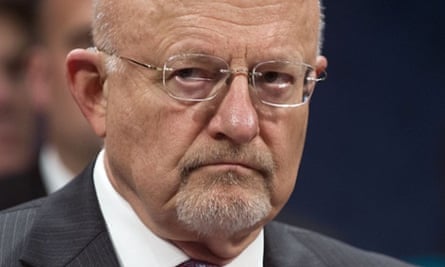Two prominent Senate critics of the NSA's dragnet surveillance have challenged the agency's assertion that the spy efforts helped stop "dozens" of terror attacks.
Mark Udall and Ron Wyden, both members of the Senate intelligence committee, said they were not convinced by the testimony of the NSA director, General Keith Alexander, on Capitol Hill on Wednesday, who claimed that evidence gleaned from surveillance helped thwart attacks in the US.
"We have not yet seen any evidence showing that the NSA's dragnet collection of Americans' phone records has produced any uniquely valuable intelligence," they said in a statement released on Thursday ahead of a widely anticipated briefing for US senators about the National Security Agency's activities.
"When you're talking about important liberties that the American people feel strongly about, and you want to have an intelligence program, you've got to make a case for why it provides unique value to the [intelligence] community atop what they can already have," Wyden, an Oregon Democrat, told the Guardian in an interview on Thursday.
Alexander testified before the Senate appropriations committee that maintaining a database of millions of Americans' phone records was critical to thwarting "dozens" of plots. One of the examples Alexander mentioned, the case of would-be New York subway bomber Najibullah Zazi, appears to have been prevented by conventional police surveillance, including efforts by UK investigators.
"Gen Alexander's testimony yesterday suggested that the NSA's bulk phone records collection program helped thwart 'dozens' of terrorist attacks, but all of the plots that he mentioned appear to have been identified using other collection methods," Wyden and Udall said in a statement. "The public deserves a clear explanation."
Alexander testified that the efficacy of the phone-records program could not be independently analysed from that of another NSA program disclosed by the Guardian, an effort called Prism that monitors the internet communications of people believed to be outside the US. In an interview with the Guardian, Wyden challenged that assertion as well.
"I have real reservations that the argument that they can't be evaluated separately," Wyden said. "If a program provides unique value, the people running it ought to explain it. I'm certainly open to doing that in a classified setting, and I know of a program where they haven't done it."
Wyden said he could not elaborate on what that program is, citing its classified nature.
Alexander also testified that the databases of Americans' phones records contains safeguards governing its searchability to prevent the NSA from abusing it. But there is ambiguity about whether a court or any outside body must grant the NSA permission to search it.
"If they claim that this program has lots of safeguards, wouldn't you expect they would detail them – 'Here are the procedures for following up on an individual'?" Wyden said. "This is certainly an issue I have a strong interest in."

The direct challenge to the NSA's veracity comes ahead of a closed-door session in the Capitol for senators to hear from Alexander directly about the details and the effects of the program. And it follows on an earlier challenge by Wyden to the truthfulness of Alexander's nominal boss, James Clapper, the director of national intelligence.
In March, Clapper responded "no" and "not wittingly" to a question from Wyden about whether the NSA collects "any type of data at all on millions or hundreds of millions of Americans." Clapper has since admitted that was the "least untruthful" answer he could have given.
Wyden pointed out that the reason he asked that question was because of an assertion Alexander made publicly at a hacker conference in July. Alexander said at the Defcon conference in Las Vegas that the NSA only collected data on Americans "incidentally, in targeting a bad guy" and that "the story we have millions or hundreds of dossiers on people is absolutely false".
"In the last day I've been struck by many people who don't want a vigorous debate, saying that somehow this discussion started on Capitol Hill," Wyden said. "This was started by General Alexander's comment in a public forum. That's why I think now we're going to have some public hearings."
Other senators who have been critical of the NSA looked forward to Thursday afternoon's closed-door briefings.
"Sen Udall is planning on attending the briefing as long as it does not conflict with markup/votes on the Senate armed services committee," Udall spokesman Mike Saccone said in an email to the Guardian.
"Sen Udall hopes he and his colleagues get specific answers out of Gen Alexander on what appears to be a discrepancy between what he told the appropriations committee yesterday [Wednesday] and the information previously provided to the intelligence committee."
Jamal Raad, a spokesman for senator Jeff Merkley, an Oregon Democrat, said: "Senator Merkley wants a clear answer to his question on how the Fisa court has interpreted the language of the law. The administration should then commit to release those interpretations to the American public in order to have a full debate."

Comments (…)
Sign in or create your Guardian account to join the discussion